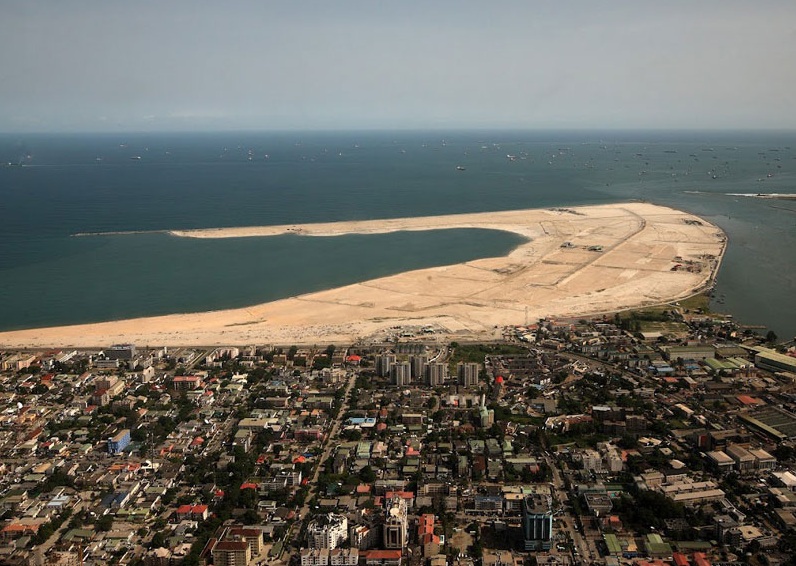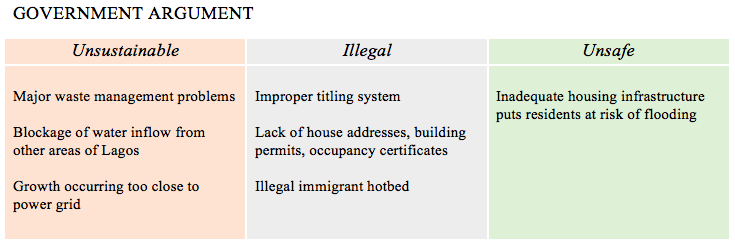Eko Atlantic
Some of the problems associated with the major construction and housing development of Eko Atlantic are:
- Quantity of housing units provided: Adding only 250,000 housing units to the megalopolis of Lagos is not enough to significantly affect the housing crisis.
- Price of the housing units: The city of Eko Atlantic will feature housing priced out of the range of the people who most desperately need secure housing.
- Environmental impact: The construction of Eko Atlantic has circumvented the legal routes for a development of such scale. Okorodudu-Fubara and Fagbohun strongly critique the Environmental Impact Assessment for the project which was only released two years after work had begun on Eko Atlantic (2012). This breaks Nigerian federal law.

- Integration with the social geography of Lagos: The city of Eko Atlantic has been poorly planned to integrate with the rest of Lagos. In and of itself, the city is well planned and physically secure, but there exists little planning as to how it will fit into the rest of Lagos, and we have “every reason to believe that the project will reinforce socio-spatial exclusion” (Adama, 2017).
- Inequitable decisions: Questions are also raised concerning the equity of the government favouring economically-charged projects like Eko Atlantic while neglecting many basic services and environmental protection of the low-lying slums in Lagos.
“Urban poverty and unplanned settlements, the lack of basic infrastructure to cope with flooding, waste disposal, sanitation and transportation in Lagos, will certainly not vanish through the establishment of a state-of-the-art Eko Atlantic City.” (Amadi, 2012)
Makoko
For Makoko, city planning initiatives like floating schools have challenged ‘normal’ conceptions of growth, and are heralded as a successful model of development meant to benefit slum dwellers. But a myriad of problems arise from living on the water. The collapse of the floating school in 2016 proves that Makoko needs more durable options – either more rigorous testing or redesign must occur. In addition, since Makoko residents are in charge of the school’s operation, not the architects, more technical training and education is required to ensure residents take responsibility. Insufficient funding is also an obstacle.
We must also consider the risks posited on each side of the slum demolition debate. The following tables detail reasons why the government wants Makoko gone, and the counterpoints for resilience:


It is clear from the arguments that NGO planners and community advocacy groups (SERAC) are mounting the resilience effort in Makoko, mobilizing its historical argument and potential for growth as a pitch to governors. But what about other informal housing zones in Lagos like Badia East, which was evicted recently in 2016? Without any historic arguments or schemes for regeneration, these other communities are the most prone to bulldozing because of their high land values. It might be wrong to assume that a revitalized Makoko could in fact be a model for formalized housing development among a sea of urban informality.
Sources:
Adama, O. (2017). Urban imaginaries: funding mega infrastructure projects in Lagos, Nigeria. GeoJournal, 1-18. Available at https://link.springer.com/article/10.1007/s10708-016-9761-8
Amadi, A. (2012). Eko Atlantic City – a sustainble development project for coastal States? Best practices from other countries. [online] Lagos: Environmental Law Research Institute, 7. Availabe at: http://dspace.africaportal.org/jspui/bitstream/123456789/35074/1/Eko%20Atlantic%20Project%20-%20Opinion%20Papers.pdf?1
Eko Atlantic (2017). About Eko Atlantic [online] Available at http://www.ekoatlantic.com/about-us/
Okorodudu-Fubara, M. & Fagbohun, L. (2012). Eko Atlantic Environmental Impact Assessment: Legal issues. [online] Lagos: Environmental Law Research Institute, 7. Availabe at: http://dspace.africaportal.org/jspui/bitstream/123456789/35074/1/Eko%20Atlantic%20Project%20-%20Opinion%20Papers.pdf?1
Oshodi, L. (2014). Makoko/Iwaya Waterfront Community; From Risk to Resilience through Regeneration Plan. [blog] Lookman Oshodi: International Development, Urban Infrastructure, and Governance. Available at https://oshlookman.wordpress.com/2014/07/10/makokoiwaya-waterfront-community-from-risk-to-resilience-through-regeneration-plan/